The USAID and NREL Quarterly Newsletter
November 2022 Edition
In this edition, meet the new USAID-NREL portfolio manager, journey through electric vehicle planning in Pakistan, read about support for renewables deployment in Colombia, and more.
Subscribe to receive this newsletter via email.
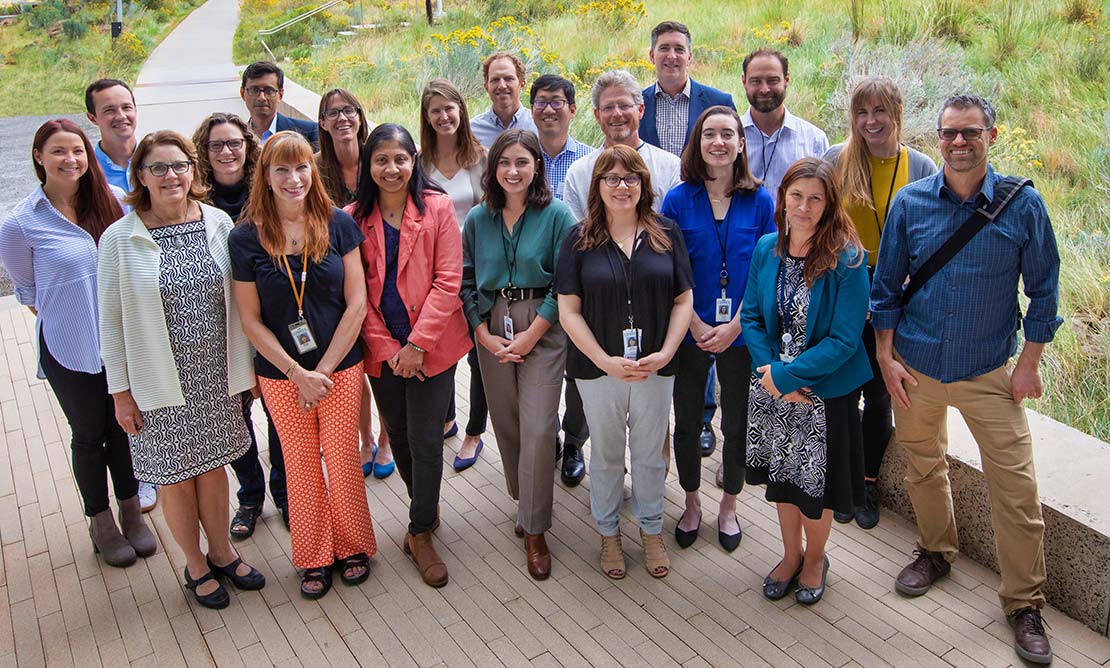
Contents
Renewing Our Dedication and Support for Global Clean Energy Transitions
RE Data Explorer Is Accelerating Clean Energy Transitions Around the World
Renewing Our Dedication and Support for Global Clean Energy Transitions
The Partnership between USAID and the U.S. Department of Energy's national labs has evolved tremendously since it began over a decade ago. It's incredible to see the impact of our work by witnessing real change on the ground. We have seen growing ambitions and confidence of our partners to modernize and decarbonize energy systems, integrate more renewable energy onto their grids, and move the needle on frontier energy technologies. It is all a testament to the strength and value of collaboration among our technical teams at the labs, USAID and its implementing partners, and the many ministries, utilities, and other institutions we work with around the world.
In June 2022, our partnership launched a new inter-agency agreement that steers the long-term direction of our work. Within this context, we took the opportunity to evaluate the structure of our partnership to ensure we are fully set up to harness the unique value of the U.S. Department of Energy national laboratories and maximize the support our teams can provide through meaningful collaboration with partner countries. Several of our USAID partners—Sarah Lawson, Jeremy Foster, and Andrew Fang, of USAID's Washington office, and Scott Bartos, of the USAID Regional Development Mission for Asia—visited the NREL campus in late September for a 2-day strategy workshop to discuss the partnership's strengths and to co-create a vision for the partnership moving forward.
As a result of this workshop, and much thought and consideration, I'm excited to share the partnership's strategic pillars of support. These four pillars, seen in the figure below, communicate the technical focus areas where our analysis, tools, and knowledge sharing are in demand and can be most impactful for partner countries' energy transitions. They also demonstrate how we plan to bolster activities under these pillars with a strong focus on energy justice and equity as well as best-in-class analytics and data.
Through these pillars, we will emphasize stakeholder-driven collaboration, offer opportunities for hand-in-hand capacity building and advanced testing and simulation of frontier energy technologies at our laboratories, foster peer-to-peer knowledge exchange, and continue to support impactful decision-making, grounded in robust analytics and data. We will also expand collaboration with complementary USAID programs and partners around the world.
Our teams are more inspired and motivated than ever to work alongside our champion partners around the world to transform and decarbonize reliable and affordable energy systems. We are looking forward to scaling up our impact over the next year and documenting and telling the story of the change we are witnessing. If you have any questions or want to know more about how you can work with the USAID-NREL Partnership, please reach out to us at USAID.NREL@nrel.gov.
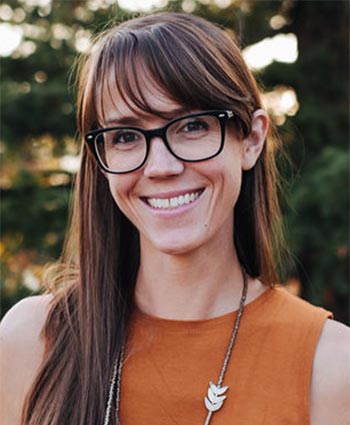
Best,
Sadie Cox
USAID-NREL Partnership Portfolio Manager
Introducing USAID-NREL's Strategic Pillars
The USAID-NREL Partnership aligns its work across six strategic pillars. Check the icons next to each story below to see how our work aligns with these themes:
USAID-NREL STRATEGIC PILLARS
National and subnational focus and across mission engagements, toolkits, and projects
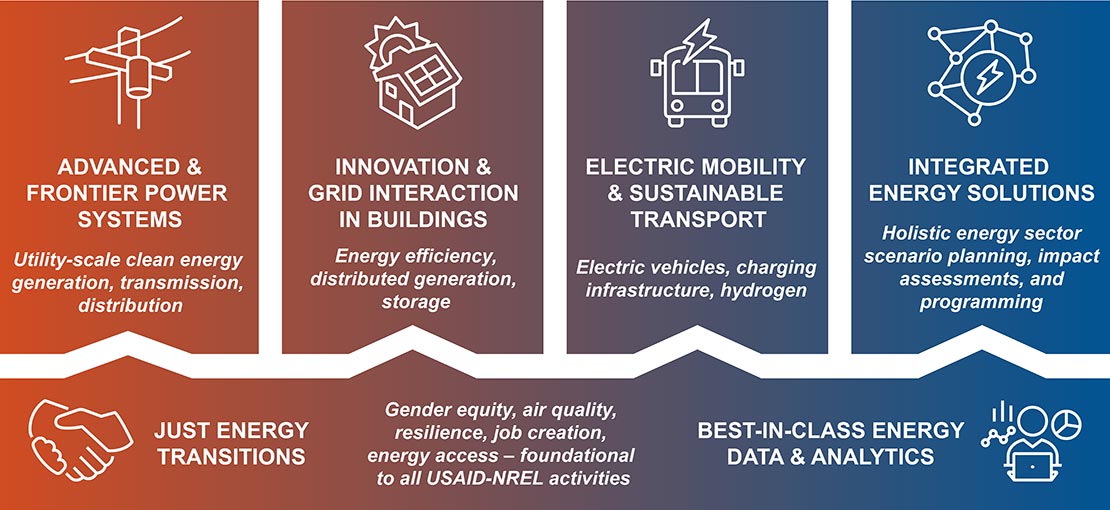
What's New
Electric Vehicles and the Grid: USAID-NREL Partnership Supports Low-Emission Integrated Energy Planning in Pakistan
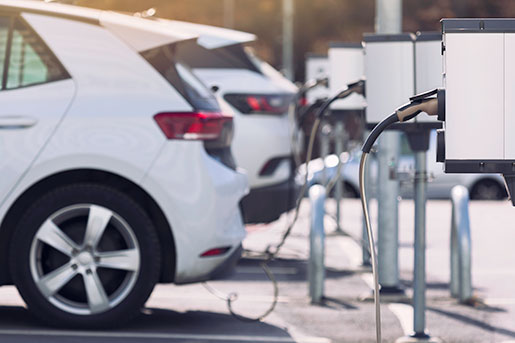
Photo from iStock
By 2030, the Pakistan National Electric Vehicle (EV) Policy calls for electrifying 30% of passenger cars and heavy trucks and 50% of two- and three-wheelers, such as motorcycles and rickshaws. Meeting these ambitious goals will require integrating EVs into an already strained energy infrastructure. Fortunately, properly equipped and managed EVs and EV supply equipment can provide multiple benefits to the grid. They can charge during times of excess electricity generation, and even store energy to improve resilience and reliability.
Realizing these benefits and creating a favorable investment climate for renewable and clean energy technologies will require an integrated planning effort across Pakistan's energy sector. To support this, USAID and NREL, in collaboration with other organizations, are bolstering Pakistan's efforts through analyses, workshops, and trainings.
Most recently, in August the USAID-NREL Partnership, the Department of Energy's Pacific Northwest National Laboratory and the Pakistan Energy Planning and Resource Centre, sponsored a week-long training at the Pakistan Planning and Management Institute in Islamabad. The training focused on the Low Emissions Analysis Platform (LEAP) tool developed by the Stockholm Environment Institute. LEAP is a powerful, versatile software system for developing integrated energy planning and climate change mitigation assessments. Guided by LEAP experts Silvia Ulloa and Jessica Slater, participants from a variety of Pakistani institutions learned how to model energy demand, supply, and emissions for different scenarios in LEAP. The training culminated in a ceremony led by Professor Ahsan Iqbal, the Pakistan federal minister for Planning Development and Special Initiatives, that is featured on the Ministry's website.
Earlier in 2022, the USAID-NREL Partnership organized several virtual EV-focused workshops in collaboration with the National Power Regulatory Authority of Pakistan and partners Lahore University of Management Sciences and the Private Financing Advisory Network.
Electric Vehicle Managed Charging in Pakistan explored charging for EVs with a focus on Pakistan's unique market and electricity grid.
Pakistan Distribution Companies Electric Vehicle Preparation Workshop provided background and next steps to help distribution companies prepare to integrate EVs into their systems.
Pakistan EV Charging Station Business Plans Workshop offered lessons about different EV charging station business and financial models as well as specifics regarding how to develop an EV charging station business plan.
For background on EVs in Pakistan, see Effectiveness of Electric Vehicle Policies and Implications for Pakistan.
RE Data Explorer Is Accelerating Clean Energy Transitions Around the World
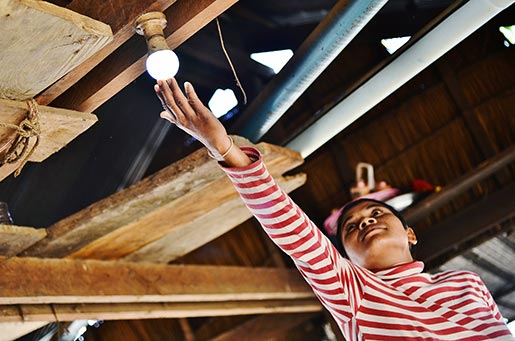
Photo from Okra Solar
Accessible and high-quality renewable energy resources are integral to net-zero energy transitions. The USAID-NREL Partnership's flagship geospatial analysis tool, the Renewable Energy (RE) Data Explorer, provides high-quality renewable energy resource data and analytic tools to inform clean energy planning and project development and stimulate investment around the world.
Users from all over have shared how they are leveraging RE Data Explorer data sets and analysis tools in their clean energy projects. Our team developed several resources to spotlight these compelling use cases:
High-Fidelity Solar Irradiance Data – Simple Access to State-of-the-Art Information Accelerates Southeast Asia's Clean Energy Economic Transformation (2022) – This brief highlights applications of the Himawari solar irradiance dataset for Southeast Asia in solar and wind grid integration studies in Vietnam, clean energy microgrid development and expanded electricity access in remote communities, and inclusive energy training and workforce development at universities and research institutes around the region.
The RE Data Explorer User Applications From Around the World video highlights user experiences from Southeast Asia to Latin America and shows how these datasets can feed into a range of tools and projects, such as rooftop photovoltaic (PV) installation on universities and factories, solar-siting tools, machine learning algorithms for solar generation prediction, and countrywide resource potential studies.
The RE Data Explorer tool is an invaluable resource for developers, power system operators, and policymakers. Explore the tool's features and tutorials by visiting the RE Data Explorer's tutorials page.
Demystifying Hydrogen for Decarbonization in Southeast Asia
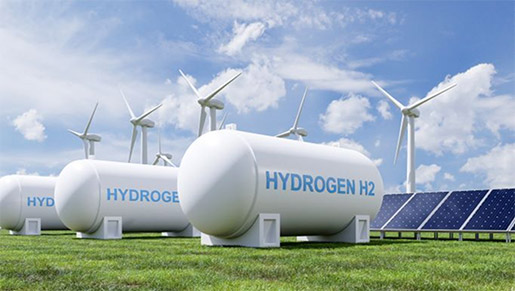
Photo from iStock
Hydrogen is emerging across the world as a low-carbon energy carrier that can provide an alternative to fossil fuels. As an energy carrier, hydrogen must be produced using other energy sources, but—once produced—it can be stored; transported; and used in hydrogen fuel cells, ammonia production, biofuels, and industrial processes, among other applications.
With the increasing deployment of renewable energy across Southeast Asia, hydrogen production through electrolysis is a potential pathway for decarbonization, particularly in strategic sectors such as chemicals, iron, steel, and long-haul transport such as heavy-duty trucks and shipping. To support scaling up this technology, NREL and USAID are developing resources about the basics of hydrogen as an emerging energy resource, including its production, storage, and transportation, use in power sector decarbonization, and cross-sectoral applications. These resources include the Hydrogen 101: Frequently Asked Questions About Hydrogen for Decarbonization (2022) technical brief and the Hydrogen for Decarbonization webinar, hosted through the Asia Enhancing Development and Growth Through Energy Power Sector Learning Series.
Lawrence Berkeley National Laboratory Leads Pilot Project Supporting Clean Development of the Hotel Industry in Quintana Roo

Photo from iStock
The Secretariat of Ecology and Environment of the state of Quintana Roo, Mexico, and Lawrence Berkeley National Laboratory (LBNL) announced the results of a pilot program supported by USAID/Mexico to promote clean development of the hotel industry.
A group of eight hotels that participated in the pilot program, implemented with the help of Quintana Roo's Secretariat of Tourism, provided energy consumption data that was analyzed using LBNL's Building Efficient Targeting Tool for Energy Retrofits to identify low- or no-cost energy efficiency measures that will result in economic and environmental benefits.
The announcement, made on Sept. 19 at a virtual event led by Secretary Efrain Villanueva Arcos, included a presentation of energy savings and emissions reductions that could be achieved by the participating hotels under different ambition scenarios. The analysis, the first of its kind targeting the hotel industry in Mexico, showed that implementation of energy efficiency measures under the High Ambition scenario could represent energy cost savings of 39.5% and 5,954.3 tCO2e greenhouse gas emissions avoided in 1 year.
The pilot program allowed entrepreneurs to identify areas of opportunity to achieve greater competitiveness by advancing energy efficiency, reducing costs, and supporting a climate-friendly development of the hotel industry in Quintana Roo.
USAID and Lawrence Berkeley National Laboratory Help Refine Demand-Side Management To Address Energy Crisis in South Africa
South Africa's electricity crisis has deteriorated significantly over the past few years, as load-shedding has become a national crisis due to nationwide rolling blackouts that impact millions of people and hamper economic development (see figure). Recent cutbacks in energy demand-side management (DSM) implementation are a major driver of the crisis, in addition to underperformance and investment in the country's primary utility, Eskom's, generation fleet. USAID and LBNL are assisting the South African Department of Mineral Resources and Energy (DMRE) in its effort to develop a strategic DSM approach to save 600 MW in the short term to reduce load shedding and maximize energy savings.

Photo from iStock
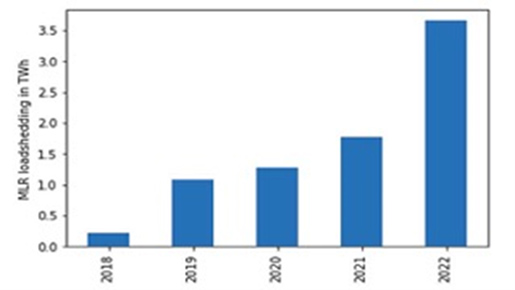
The LBNL team was invited by DMRE to an internal workshop to share the initial findings of its analysis on DMRE's plan to integrate energy efficiency as part of President Cyril Ramaphosa's emergency response plan to address the nation's energy crisis. As a result of this technical assistance, the LBNL team is helping Eskom and DMRE shape the overall structure of a new DSM program that will link ongoing energy efficiency activities through increased coordination and inter-governmental collaboration. Modeling work developed as part of a collaboration between LBNL and the University of Cape Town with co-funding from the South African National Energy Development Institute will identify opportunities to reduce peak demand in the short and medium terms. This work will also assess CO2 emission mitigation opportunities and inform South Africa's strategy to meet its national climate goals.
By supporting South Africa DSM program development, USAID is contributing to save energy rapidly, alleviating the pressures on the grid that are causing rolling blackouts, and, in the process, avoid costs associated with building new generators and transmission lines, saving customers money, and lower greenhouse gas emissions and pollution from coal power plants.
Women in Power System Transformation Is Expanding Leadership and Technical Training Opportunities for Women
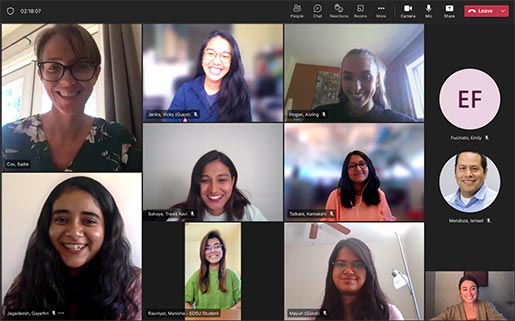
Photo by Hallie Lucas, NREL
Women in Power System Transformation (PST), a joint initiative from the USAID-NREL Partnership and the Global Power System Transformation Consortium (G-PST), addresses educational and professional barriers to women's entry and advancement in power system operation organizations and advances gender diversity, equity, and inclusion across this important sector. From June through September 2022, the initiative sponsored the placement of graduate women interns in-person at NREL and the Electric Power Research Institute (EPRI) in Palo Alto, California.
Throughout the internships, these young women leaders learned hands-on skills by working closely with NREL and EPRI researchers on cutting-edge power systems analyses and clean energy integration activities. They participated in bi-weekly coffee chats with women professionals and experts in their field. Interns also completed agency-based empowerment training with the Johns Hopkins University Self-Empowerment and Equity for Change (SEE Change) program, along with 33 other participants from power system operators, women's networks, and technical institutions from around the world. The Women in PST program also collaborated with California Independent System Operator (CAISO)'s fellowship program with the national system operator for Indonesia, PLN, offering fellows the opportunity to participate in the SEE Change training and other Women in PST events. In August, the Women in PST interns presented their technical work and discussed how their experiences will help them strengthen decision making and drive development of dynamic energy system solutions.
"As the first women intern in CAISO from PT PLN, it made me realize that I can do what I thought impossible," said Uswatun Khasanah, a CAISO-PLN participant.
In August, Women in PST interns presented their technical work and discussed how their experiences will help them strengthen decision-making and drive development of dynamic energy system solutions.
"It is important to bring gender equity into power system transformation because the rights, responsibilities, and needs should remain fair and same for both male and female. If I face any such situation in my professional or social life, I now feel equipped to integrate gender equity while making any decision or actions," said NREL intern Manisha Rauniyar, originally from Nepal, in her exit survey.
In November, representatives from the Women in PST program will join 23 leaders and human resource professionals from system operators and utilities from India, Colombia, and Indonesia for USAID's Engendering Industries Workforce Gender Equality Accelerated Program. Following this training, participants will develop gender action plans to address institutional barriers within their organizations to increase the representation and retention of women in technical and leadership roles in the power sector.
USAID and NREL Strengthen Cybersecurity Practices for Latin America and the Caribbean

Photo from iStock
Power sector utilities in Latin America and the Caribbean face a host of cybersecurity challenges, ranging from ransomware attacks to implementing appropriate awareness and training programs. These cybersecurity challenges can threaten the stability and resilience of power systems throughout the region. On Aug. 18, 2022, USAID-NREL Partnership cybersecurity specialists Tami Reynolds and Laura Leddy met with employees of the St. Kitts Electricity Co. to demonstrate NREL's Distributed Energy Resource Cybersecurity Framework (DERCF) tool and begin facilitating the DERCF assessment process. The DERCF tool assists utilities such as St. Kitts Electricity Co. in understanding their current cybersecurity posture and where gaps exist. Equipped with a holistic picture of their cybersecurity needs, power sector utilities can then work with implementing partners to create a roadmap for improvements that better secure their energy systems.
The USAID-NREL Partnership, through the Resilient Energy Platform also helps organizations develop robust cybersecurity defenses through a variety of channels. The universal Power Sector Cybersecurity Building Blocks guide, and its complementing webinar series, is specifically geared toward small utilities in Latin America and the Caribbean. In August 2022, the latest installment of the webinar series explored how utilities can bolster cybersecurity in operational technology. NREL cybersecurity researcher Anuj Sanghvi presented on the value of asset discovery in an operational technology environment, a critical step for utilities in understanding which assets and devices they need to protect. The webinar shared best practices and solutions to improve operational technology systems' cybersecurity posture and provided an opportunity for stakeholders to discuss questions or concerns directly with experts.
View the recording of the Power Sector Cybersecurity Building Blocks webinar and learn more about the USAID-NREL Partnership's cybersecurity activities.
Supporting Renewable Uptake in Tanzania Through Advanced Transmission Planning and Analysis Software Training
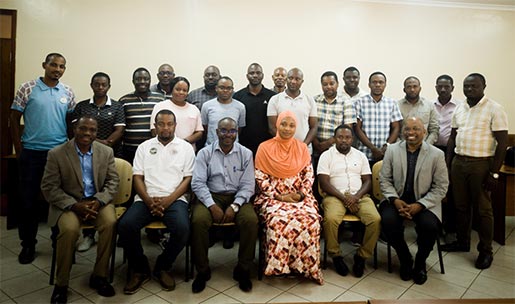
Photo courtesy of Jonathan Seni of Kwapamoja Ltd.
One of the challenges of deploying renewable energy in Tanzania and around the globe is determining how to grow energy supply safely and reliably. To address this issue in Tanzania, USAID and NREL are providing technical assistance and training to support increased renewable energy deployment and power sector resilience. NREL, in collaboration with Power Africa—East Africa Energy Program, hosted a training on the power system modeling tool, Power System Simulator for Engineering (PSS/E), for 25 Tanzania Electric Supply Co. (TANESCO) engineers in August 2022. TANESCO generates, transmits, distributes, and sells electricity on the Tanzanian mainland and sells bulk power to the Zanzibar Electricity Corp. on the island of Zanzibar. This training builds on a past, virtual workshop for power sector stakeholders from the Tanzanian mainland and Zanzibar that focused on supporting Tanzania's transition to a cleaner grid.
The goal of the PSS/E workshop was to build confidence with TANESCO engineers to use the tool to further integrate variable renewable energy generation into the Tanzanian power system. It focused on hands-on activities so attendees could immediately apply new skills to real-world circumstances and troubleshoot problems. NREL researchers Kwami Senam Sedzro and Aadil Latif led participants through the process of building test cases from scratch and performing analyses on all aspects of renewable integration impact evaluation.
During the training, the TANESCO engineers indicated they could benefit from ongoing assistance to firm up their PSS/E skills and help them prepare for the energy transition in Tanzania. To address questions and support PSS/E skill building, Sedzro offered the trainees weekly office hours going forward.
Distributed Generation Market Demand Model (dGen) Results Published on Distributed PV Deployment Scenarios for Barranquilla, Colombia

Photo from iStock
NREL used the open-source dGen model, adapted for international projects, to analyze the deployment of distributed PV across sectors in Barranquilla, Colombia. As part of this analysis, researchers considered the technical potential, economic potential, and adoption projections of rooftop and ground-mounted PV for the city of Barranquilla. Five main scenarios and combinations of those scenarios were modeled to provide insight into the impact of increased demand from EVs, air conditioning, and time-of-use tariffs.
The dGen Barranquilla analysis offers projections through 2050 on the effects of distributed PV deployment by sector for a range of scenarios. This analysis provides important insights that stakeholders can use to shape policy and regulation for distributed PV deployment in the region while ensuring that the future power system is adapted to support future distributed energy resources.
For more information, explore the full deck: Forecasting Distributed PV Adoption in Barranquilla, Colombia.
NREL Provides Review of Colombian Geothermal, Hydrogen, and Offshore Wind Decrees
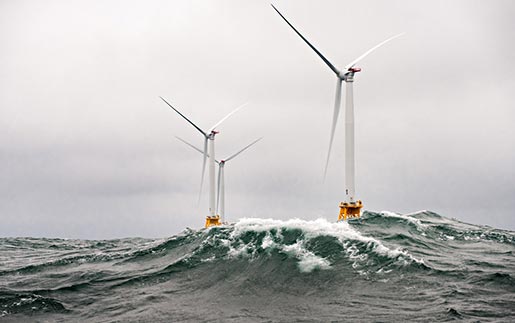
Photo by Dennis Shroeder, NREL
The USAID-NREL Partnership is providing technical support to the government of Colombia on a variety of renewable energy technical, policy, and regulatory questions to support Colombia's energy transition to renewables. As part of this support, USAID, NREL, and two implementing partners—the United States Energy Association and the Tetra Tech Scaling Up Renewable Energy (SURE) program—organized several interactive workshops on geothermal, hydrogen, and offshore wind policy and regulatory topics and provided senior review of several proposed decrees and resolutions for geothermal, hydrogen, and offshore wind installations. In August 2022, this project culminated with the publishing of two decrees on hydrogen and two resolutions: a geothermal resolution and an offshore wind installations resolution.
The review and technical assistance provided by the USAID-NREL Partnership helped ensure these regulatory framework documents were technically sound. The published decrees and resolutions are key steps in the process of advancing hydrogen, geothermal, and offshore wind development in Colombia, and supporting Colombia's energy transition toward an ever-increasing share of renewable and clean energy options.
For more information, see Supporting Colombia's Clean Energy Transition.
Engaging Indigenous Students in La Guajira: USAID-NREL Partnership Supports Colombian Energy Transition Through Wind and Solar Trainings
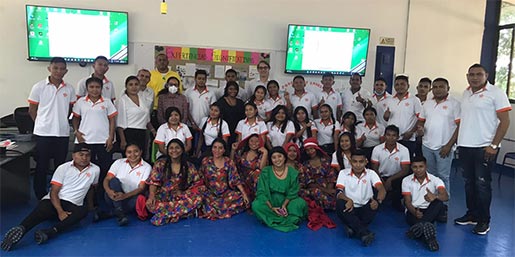
Representatives from Tunisia's national utility, The Tunisian Company of Electricity and Gas, with NREL researchers touring NREL's South Table Mountain Campus. Photo by Carishma Gokhale-Welch
La Guajira has the greatest wind and solar potential of any region in Colombia, with a significant amount of new renewable energy project development already underway. In August 2022, representatives of the USAID-NREL Partnership presented technical training modules on "Perspectives and Tendencies in Solar and Wind Energy" to students representing La Guajira indigenous communities. The training was part of the SENA (Colombia's technical training institute)-La Guajira Energy Transition training program supported by the USAID Colombia mission. The training content was originally presented by Michael Ingram as part of the Young Leaders Capacity Building Program and, along with three upcoming webinars, has been translated into Spanish and included in the SENA-La Guajira program. Students provided positive feedback to USAID and SENA expressed that they are looking forward to the upcoming modules.
On Sept. 15, 2022, the USAID-NREL Partnership supported another workshop as part of the La Guajira indigenous community training program that discussed how to engage indigenous communities in energy projects, with a focus on community solar.
These trainings build positive interest in Colombia's energy transition among the indigenous communities of La Guajira by highlighting opportunities for workforce development and describing the co-benefits of renewable energy development. The new Colombian government has made its ambitious renewable energy goals for this region, as well as its support for indigenous communities, high priorities.
Team Spotlight

Meet Hallie Lucas!
Tell us about your role in the USAID portfolio.
As a researcher and project leader with the USAID-NREL Partnership, I am fortunate to collaborate with partners around the world to help achieve their clean energy transition priorities. I bring together cross-lab technical teams to provide strategic energy sector assistance in Tunisia, develop publicly available knowledge resources and tools that can support clean energy decisions, and advance just energy transitions through the Women in Power System Transformation initiative.
What inspired you to work on international projects?
A biologist and ecologist by training, I have always cared deeply for the integrity of Earth's natural systems. I remember when I first learned about climate change–the gravity and magnitude of the climate crisis deeply alarmed me, and I recognized this was a challenge that was going to be solved at a global scale. As a graduate student, I became passionate about the intersection between clean energy access, environmental quality, and public health and knew that I would focus my career on improving human livelihoods through clean energy deployment.
What excites you most about the work that you're doing?
I am continually energized by the dedication and ambition of our global partners who are committed to advancing clean, affordable, reliable, and inclusive energy. I am also excited by the opportunity (and the great challenge) that energy system transformation provides–as a true inflection point in human history–to restructure traditional decision making in the energy sector and empower diverse leaders at all scales to drive systemic change.
In what ways does your work accelerate the deployment of sustainable, advanced energy systems around the world?
I work in collaboration with diverse technical teams to provide energy sector stakeholders with the technical tools and resources needed to answer specific clean energy questions, including distributed energy resource integration, power sector resilience, and multi-sector energy planning. My work with Women in Power System Transformation supports sustainable decision making in the power sector through the representation, advancement, and retention of women leaders, at all career levels.
Stay Current
Explore all July 2022–October 2022 publications, events, and resources below.
Free Trainings
July 2022
Hydrogen for Decarbonization in Southeast Asia – FAQs and Potential Uses
Pakistan Distribution Companies Electric Vehicle Preparation Workshop
Pakistan EV Charging Station Business Plans Workshop
August 2022
Power Sector Cybersecurity Building Blocks Webinar Series: Operational Technology
October 2022
2022 Women in Power System Transformation Internship Virtual Poster Session
Must Reads
July 2022
Hydrogen 101: Frequently Asked Questions About Hydrogen for Decarbonization
High Fidelity Solar Irradiance Data
September 2022
Forecasting Distributed PV Adoption in Barranquilla, Colombia
Must Watch
October 2022
Share


